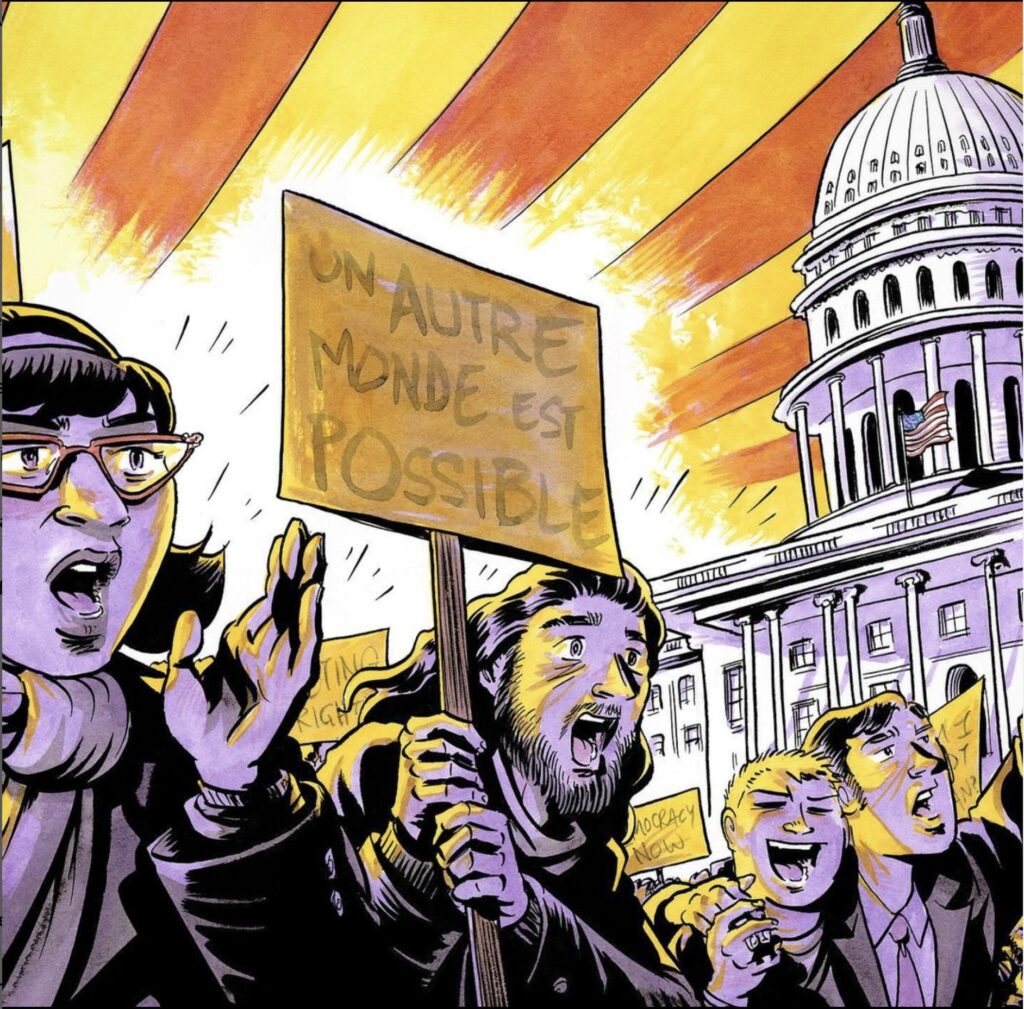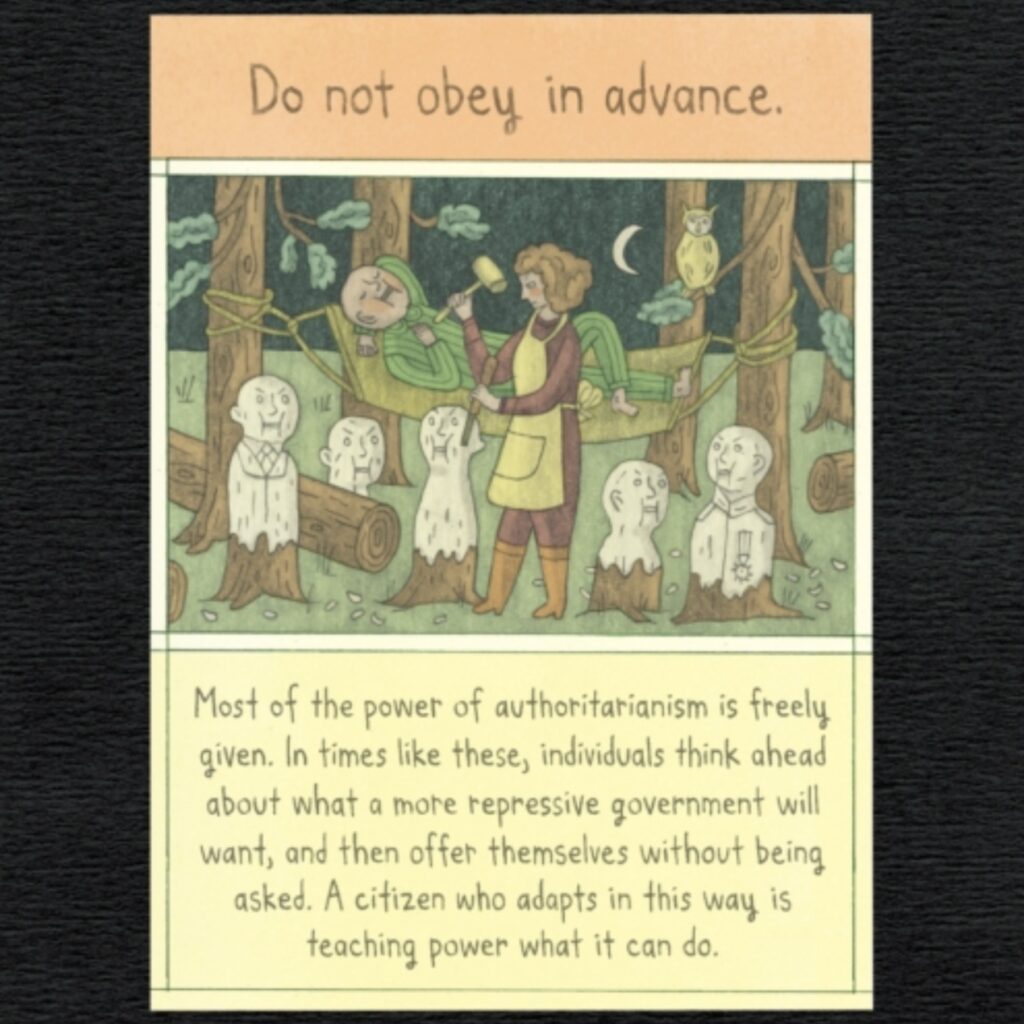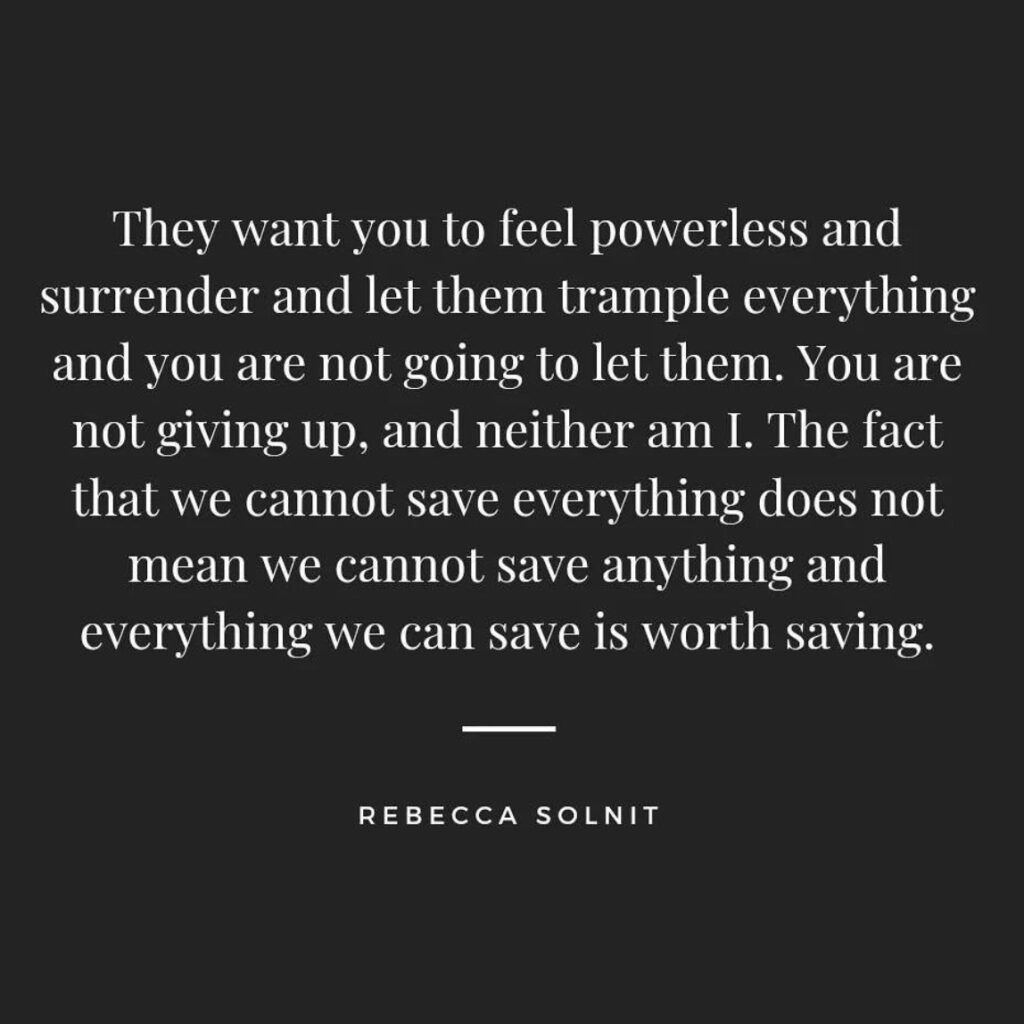
“another world is not only possible, she’s on her way.”
I offer this quotation to encourage you to sustain a sense of possibility, however contingent or uncertain. Because another world is possible. I cannot predict whether we will see that world, but it is nonetheless worth fighting for. Activists may not see the full fruits of their activism, but that does not invalidate the effort. If anything, it makes the effort all that more urgent.
What do we do now?
First, remember that “You Are Not Alone” — as I wrote to my students on the day after the election.
Second, there’s a lot that we can do. To feel less overwhelmed by all I’ve read and thought about this question, I’m organizing it here — both for myself and for you. Indeed, if any of this is of use, feel free to mirror this page somewhere else. Or incorporate pieces into your newsletter or website. Please also send me anything vital that I’ve missed!
I’m breaking it down into three parts:
- Pragmatism. Practical steps you can take, starting now.
- Inspiration. Ideas to help sustain yourself and others.
- Information. Tips on how to keep informed under autocracy.
1. Pragmatism
Establish a moral compass.
What are your core values? On what would you not compromise? Write it down now. Or at least commit it to memory now. When you do, you will also be fortifying yourself against autocracy’s persistent pressure to compromise and its attempts to gaslight you into capitulating.
Here are the three principles that guide me — offered in no particular order, and offered only as an example. (Your compass does not need to be identical to mine. It is your compass.)
- Tell the truth — for as long as you can. In my writing and my teaching, in my public life and my private life, I will be precise in my language, embrace the full complexities of history, even (and especially) when telling these truths exposes the regime’s lies. As Timothy Snyder’s On Tyranny (2017) advises, “Do not obey in advance…. A citizen who adapts in this way is teaching power what it can do.”
- Take care of others — especially the most vulnerable, because they will suffer the most. The humanity of others is not subject to debate. Use what power you have to protect others.
- Take care of yourself. Exercise, be receptive to joy, maintain a private life. The struggle is a marathon, not a sprint. So, be kind to yourself.
Use the next 60 days to prepare.
- Are there any vaccines or other medical items you might need in the next four years? If RFK Jr. becomes Secretary of Health and Human Services, they may become unavailable. Project 2025 also plans to restrict access to birth control / contraception.
- Are there any big purchases you’ve been putting off? If you can afford to make them now, do. If enacted, tariffs and mass deportations will raise prices and may ultimately crash the economy. (Mass deportations are also a moral abomination, of course.)
- Is your passport up to date? Or do you lack a passport? Now is the time to get one or to get yours renewed.
- Here are more suggestions from Sherrilyn Ifill. Scroll down to the bullet points.
Let love fuel the fight.
Some activism will be motivated by anger. Indeed, activism is a good place to direct your anger.
However, an activism fueled only by anger is not sustainable over the long haul. Anger burns quickly and even brightly, but it can also deplete you.
Fight for love — of justice, of your neighbors, of the world you want to live in. While you should not deny your anger (or grief, or disappointment), remember that love is sustainable in ways that anger is not.
Pick your battles.
You cannot fight on all fronts, and nor should you expect to. Choose just a few issues that are important to you — maybe one or two. Focus on those. As Rebecca Solnit wrote a couple of weeks ago, “The fact that we cannot save everything does not mean we cannot save anything and everything we can save is worth saving.” And as Rabbi Tarfon said roughly two millennia ago, “It is not your duty to finish the work, but neither are you at liberty to neglect it.”
Go Local.
Local networks will be key to resisting the incoming regime. The loose, federated organization of the United States will make a full-on fascist autocracy more challenging to impose. Some areas will become very fascist — indeed, some already are. Others will not. Wherever you live, seek democrats (of any party), form alliances, decide what to protect, and take action.
Get Organized.
You don’t need to reinvent the wheel. There are already groups fighting for democracy, reproductive rights, criminal justice reform, civil rights, and so on. They may have a local affiliate. Or you could found a local affiliate, drawing on their resources. You could donate your time. If you have any capital, you could also make a donation.
As you chart your path forward, “Indivisible: A Practical Guide to Democracy on the Brink” is very helpful. And here are organizations you might consider joining, supporting, or both:
- The ACLU is a national organization with local chapters.
- Brennan Center for Justice. See the Get Involved page.
- Choose Democracy. See We are in administrative coup and What can I do to fight this coup?
- Indivisible. See the Find Your Group page and the Find an Event page. You can also organize a group or event in your area. Indivisible’s newsletter gives you a helpful weekly to-do list of actions to take.
- KIND: Kids in Need of Defense. See the Get Involved page. To fight promised mass deportations and family separations, help provide legal assistance to children.
- League of Women Voters. There are many local chapters, and you don’t need to be a woman to work with the organization. (I worked with them this fall, registering voters.)
- Movement Voter Project. Strategic voter turnout. Midterm elections are in 2026.
- NAACP Legal Defense Fund. See the Volunteer with Black Voters on the Rise page. Again, the midterm elections are in 2026.
- Planned Parenthood. See the Jobs and Volunteering pages. Project 2025 has abortion rights in it sights, to say nothing of the misinformation campaigns promoted by it and its allies.
- RAICES. Founded in 1986 as the Refugee Aid Project, the Refugee and Immigrant Center for Education and Legal Services (RAICES) is “fighting for the freedoms of immigrant, refugee, and asylum-seeking people and families.” See the Volunteer FAQ.
- Southern Poverty Law Center. See Our Initiatives, Hopewatch, and Hatewatch.
- United We Dream. Founded in 1999, United We Dream fights for the rights of immigrants. See the pages compiling Resources and on Our Work. I also found particularly helpful this page on How U.S. Citizens Can Protect the Immigrant Community From the Deportation Force.
Above resources last updated on 12 Feb. 2025
2. Inspiration
How can we be one of the stars in the darkness? How can we, to quote the lyrical conclusion to Vice President Harris’s concession speech, “fill the sky with the light of a billion brilliant stars,… the light of optimism, of faith, of truth, and service”? I have been turning to others’ wise words for guidance. Here are five quotations.
“To be hopeful in bad times is not just foolishly romantic. It is based on the fact that human history is a history not only of cruelty but also of compassion, sacrifice, courage, kindness. What we choose to emphasize in this complex history will determine our lives. If we see only the worst, it destroys our capacity to do something. If we remember those times and places — and there are so many — where people have behaved magnificently, this gives us the energy to act, and at least the possibility of sending this spinning top of a world in a different direction. And if we do act, in however small a way, we don’t have to wait for some grand utopian future. The future is an infinite succession of presents, and to live now as we think human beings should live, in defiance of all that is bad around us, is itself a marvelous victory.”
— Howard Zinn, “The Optimism of Uncertainty,” The Nation, 2 Sept. 2004
“Stay strong by acknowledging the grief you are experiencing and the grief of everyone around you.
Stay strong by remembering that any powerlessness we feel in the face of these collective horrors will not be alleviated by policing or attacking each other.
Stay strong by continuing to listen.
Stay strong by accessing the quiet you need.
Stay strong by reaching for coalition and organizing, you cannot face this time alone and you were not meant to. You do not have all the answers and you do not need to.
Staying strong is not an individual achievement. It is not a performance. It is not something to prove. It is not possible in isolation.
Reach and remember. Breathe and believe. The decision to stay present and engaged is yours. But the strength of a love so powerful it can show up as care instead of domination? That is already flowing through all of us towards you. Even and especially in the most uncertain of times.”
— Alexis Pauline Gumbs, “Stay Strong,” Southern Cultures, Fall 2024
“It is not your duty to finish the work, but neither are you at liberty to neglect it”
— Rabbi Tarfon, comment on Micah 6:8 in The Talmud
“Written about 11pm on Nov. 5, 2024: They want you to feel powerless and to surrender and to let them trample everything and you are not going to let them. You are not giving up, and neither am I. The fact that we cannot save everything does not mean we cannot save anything and everything we can save is worth saving. You may need to grieve or scream or take time off, but you have a role no matter what, and right now good friends and good principles are worth gathering in. Remember what you love. Remember what loves you. Remember in this tide of hate what love is. The pain you feel is because of what you love.
The Wobblies used to say don’t mourn, organize, but you can do both at once and you don’t have to organize right away in this moment of furious mourning. You can be heartbroken or furious or both at once; you can scream in your car or on a cliff; you can also get up tomorrow and water the flowerpots and call someone who’s upset and check your equipment for going onward. A lot of us are going to come under direct attack, and a lot of us are going to resist by building solidarity and sanctuary. Gather up your resources, the metaphysical ones that are heart and soul and care, as well as the practical ones.
People kept the faith in the dictatorships of South America in the 1970s and 1980s, in the East Bloc countries and the USSR, women are protesting right now in Iran and people there are writing poetry. There is no alternative to persevering, and that does not require you to feel good. You can keep walking whether it’s sunny or raining. Take care of yourself and remember that taking care of something else is an important part of taking care of yourself, because you are interwoven with the ten trillion things in this single garment of destiny that has been stained and torn, but is still being woven and mended and washed.”
— Rebecca Solnit, Facebook post, 10 Nov. 2024
“I can’t be a pessimist, because I am alive. To be a pessimist means you have agreed that human life is an academic matter, so I’m forced to be an optimist. I’m forced to believe that we can survive whatever we must survive.”
— James Baldwin, “The Negro and the American Promise” (1963), quoted in I Am Not Your Negro, directed by Raoul Peck (2016)
To try to sustain positive energy, I’ve also assembled an upbeat activist playlist.
After the repeal of Roe, I also made this playlist — which includes a wider variety of emotional responses, from angry to funny.
3. Information

You may want to tune out. But do not tune out. Keep yourself informed.
This does not mean watching the news all day or doomscrolling endlessly. Indeed, please do not let the algorithm choose your information for you. Choose reliable sources.
And moderate your diet of news. The deranged orange bloviator is a parasite who colonizes human consciousness. Grant yourself space not to listen to the lies, gaslighting, and hatred.
To minimize hearing Agent Orange’s voice and seeing its face, I will get most of my news via print sources. You should do whatever works best for you.
Good sources of news and information.
In autocratic states, the press faces even greater pressure to appease the autocrat. Surrendering in advance of the election, oligarch Jeff Bezos refused to allow The Washington Post (which he owns) to run its endorsement of the Harris-Walz ticket. Less than two weeks after the election, MSNBC hosts Joe Scarborough and Mika Brzezinski decided to make amends with the fascist thug they had warned us against. So, you might seek media not owned by large US corporations.
International News
Subscribe to a newspaper located outside of the United States. I read The Guardian. If you speak other languages, read papers in different languages.
Independent Media
Newsletters by smart people
- Heather Cox Richardson’s Letters from an American. A historian, Richardson writes a daily newsletter, often placing the present in historical context.
- Ruth Ben-Ghiat’s Lucid. Ben-Ghiat is also an historian; her expertise is fascism, authoritarianism, and propaganda. The newsletter typically publishes about twice a week.
- Timothy Snyder’s Thinking About. A leading scholar of Eastern Europe and expert on authoritarianism, Snyder is the author of the indispensable book On Tyranny: Twenty Lessons from the Twentieth Century (2017).
- Sherrilyn Ifill’s Sherrilyn’s Newsletter. Ifill is President and Director-Counsel of the NAACP Legal Defense and Educational Fund. Her newsletter has been more active after the election.
- Jared Yates Sexton’s Dispatches from a Collapsing State. A former Associate Professor of English, Sexton is now a journalist, and is the author of American Rule: How A Nation Conquered The World But Failed Its People (2020), among other titles.
- Judd Legum’s Popular Information. Legum is founder and editor of ThinkProgress, and was the Research Director for Hillary Clinton’s 2008 campaign.
- Carole Cadwalladr’s The Power. An investigative journalist, Cadwalladr was nominated for a Pulitzer for her work in breaking the Cambridge Analytica/Facebook story.
- Rebecca Solnit’s Meditations in an Emergency. From the historian, activist, and author of Hope in the Dark.
- Amy Siskind’s The List: This Is How Democracy Ends. Despite the gloomy subtitle, Siskind’s weekly newsletter is a hopeful project. In offering a weekly reckoning of what Trump and his gang of thieves are up to, The List offers a path through the avalanche of sh*t and helps us make sense of it.
If you can afford to, please pay to subscribe!
General Resources
- American Autocracy Threat Tracker. “A Comprehensive Catalog Based on Donald Trump and His Associates’ Plans, Promises, and Propositions.”
- Protect Democracy. “The 250-year American experiment in self-government is threatened by a global rise in authoritarianism. Together, we can preserve democracy for future generations.”
- Stop Project 2025 Comic. Comics artists explain “Mandate for Leadership: The Conservative Promise,” aka Project 2025.
“News and Information” resources last updated on 17 Feb. 2025
Helpful analyses of the 2024 US Election & what we face now.
- David Corn, “Can a Democracy Reverse a Slide Toward Authoritarianism?” Mother Jones, Nov. 2024
- Sherrilyn Ifill, “Why Are We Here?: A Dispatch from the Nadir,” Sherrilyn’s Newsletter, 6 Nov. 2024
- Timothy Snyder, “The Phantom Campaign,” Thinking About…, 17 Nov. 2024
- Carole Cadwalladr, “How to Survive the Broligarchy,” The Power, 17 Nov. 2024
- George Lakoff and Gil Duran, “2025: Keep democracy alive. Our New Year’s resolutions,” FrameLab 1 Jan. 2025
- Joan Westenberg, “We Don’t Need More Cynics. We Need More Builders.” westernberg. 14 Jan. 2025
- Carole Cadwalladr, “IT IS A COUP,” The Power 10 Feb. 2025.
“Helpful analyses…” list last updated on 11 Feb. 2025
Related (on the blog unless otherwise indicated)
- RESIST
- “You Are Not Alone: A Letter to My Students After the 2024 US Election” (6 Nov. 2024).
- “Resolutions for a New Academic Year: A survival guide for higher education in perilous times” (Chronicle of Higher Education, 5 Sept. 2017)
- “The Public University in an Age of Alt-Facts: Remarks on Receiving a Higuchi Award” (13 Dec. 2016)
- “Surviving Trumpism, Restoring Democracy” (12 Nov. 2016)
- CHILDREN’S LITERATURE & EDUCATION
- “Defending the Right to Read: Resources for Opposing Book Bans” (1 Jan. 2024).
- “Why Are People Afraid of Multicultural Children’s Books” (Geschichte der Gegenwart, 21 May 2023). See also the related blog post.
- “Breaking up with your favorite childhood classic books” (Washington Post, 16 May 2021).
- “Seuss, Racism, and Resources for Anti-Racist Children’s Literature” (9 Mar. 2021).
- “Trump is a liar. Tell children the truth” (Public Books, 15 Oct. 2019). See also the related blog post on the essay.
- “Migration, Refugees, and Diaspora in Children’s Literature” (ChLAQ) (11 Dec. 2018). Blog post announcing special issue of the Children’s Literature Association Quarterly on this subject, including excerpts from my introduction.
- Refugee Stories for Young Readers (Public Books, 23 Mar. 2017). Francesca Sanna’s The Journey and other contemporary refugee tales for children.



marjorie
Philip Nel
Annette Wannamaker
Philip Nel
Katherine Donlon
Philip Nel
Linnea Hendrickson
Philip Nel